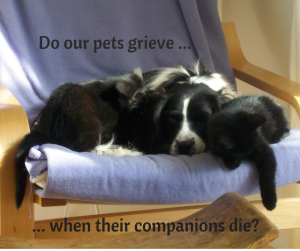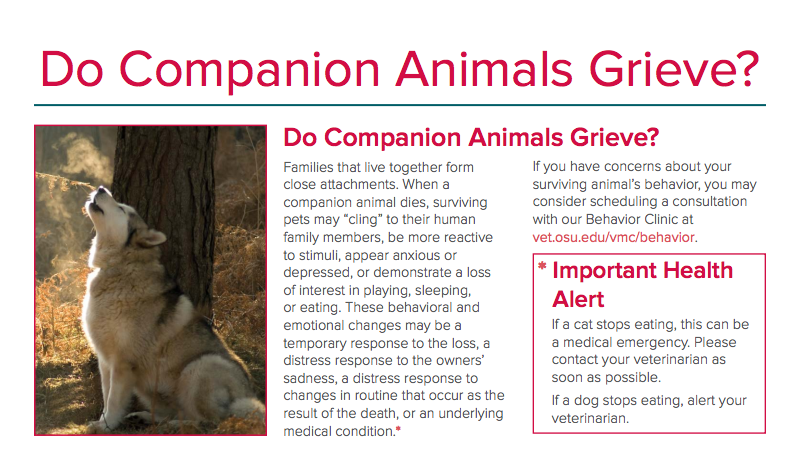
I get asked the question ‘Do pets grieve too?’ quite frequently. Some people feel sure that their pets do grieve when one of their companions dies (just like pets can grieve and pine when their human companions die or when they are separated from them).
Other people are more skeptical and see it more as separation anxiety or the change of circumstance or routine that causes the issue rather than believing that the pet is actually grieving.
As I declare in this week’s video, my experience indicates that pets can indeed grieve for the loss of their friends and also that it’s different for all of them and depends on a variety of factors.
It depends …
While some pets openly show signs of grief, others may not. They are all individual and their responses, levels of grief and outward showing of grief will vary.
For example, my Leo (pictured above when a young kitten with his sister Purr and Sally the dog) showed open signs of grief when Purr was run over (as I discuss in this week’s video) whilst Sally didn’t have the same response. Part of this was, I suspect, trauma, as I reckon that Leo was present when Purr was run over. but also, a sense of the loss of his companion and that friendship. Afterwards, Leo and Sally became even closer.
There are some factors that can be influential, such as
The relationship between the pets – how closely they are bonded, how long they spend in each others company.
The temperament of the pet – if they are nervy or prone to anxious behaviour they may react more openly to the loss.
The circumstances – a sudden death or loss can be more challenging or confusing to come to terms with than a longer decline or illness.
Other pet dynamics – how does the death affect the hierarchy of the other pets? Did they lose a leader or a defender?
Your response to the death – our pets pick up on our emotions and grief and can react to that.
And, it’s still individual, for each pet, for each circumstance.
What are the signs?
There are some signs of pet grief after the loss of a companion, such as
Lethargy
Loss of interest in play or activities
Loss of interest in food
Upset at being left alone
Looking for their friend
How can we help them?
1. Be present with them and with what has changed.
Our pets pick on on our emotions (and they know when we’re trying to hide our feelings from them or hide our concern about them), so I encourage people to ‘be honest’ with them. Having a conversation with your pet, like they were a bereaved friend can be helpful, as they pick up the essence and intention of what we are saying.
This is especially important if the death was sudden and if they haven’t seen the body of the deceased pet. Where possible I have always let me pets see and touch their deceased companions, but where that isn’t possible or practical I ‘show’ them the picture of what happened, so they can comprehend that their friend isn’t coming back.
2. Do we give them extra attention?
We can indeed console them and give them extra tlc if they are seeming ‘down’. For my Leo, he ‘asked’ for attention (and healing) so it was obvious. Also, if it comforts them, the interaction is also comforting to us, so it can be a win win situation.
However, it’s important not to re-enforce unwanted behaviour. For example, if they aren’t eating much, it may not be wise to hover over their food bowl or coo over them to get them to eat in case they see that as praise for not eating. It’s better to positively praise when they do eat, or they are more interactive. Obviously, if your pet isn’t eating, or is acting very differently, do check with your vet in case it is related to a medical condition. Also be aware that it can take time for a pet to grieve, just like with humans.
3. Acknowledge your own grief.
I’ve said this before but it’s worth saying again. Our pets are very sensitive to our emotional and mental states and they will pick up on our grief. So, be honest with them. Sometimes it can be devastating for us when a pet dies. You can tell them that you’re sad about it right now … and that you still love them. I also encourage people to look at ways to face their grief – memorials and therapeutic tools to help them deal with and work through the emotions that come up as part of the grieving process.
4. Natural ways to help them and you.
For me, the technique of Emotional Freedom Techniques (EFT tapping) is an absolute gift for helping people and pets to navigate through the changes and emotions that we face when navigating the death or loss of a pet. I’ve seen it make a huge difference and pets respond to it very fast. It is a technique that can help to ease all the signs of grief our pets display AND it can also address underlying issues too.
See below this post for my free video series showing how to use the tapping for pets and, for the humans who are grieving see also this tapping video for Pet bereavement (as we acknowledge and look at our emotions, it does help our remaining pets).
As I mention in this week’s video, flower essences such as Walnut for change, can be beneficial for both people and pets, as can other natural remedies. When using natural remedies please be sure they are safe for your pet to consume and will not affect any other medication that your pet is receiving.
Two pet grief stories
In this week’s video I share two very different stories of how pets have been affected by the death of an animal friend.
Stances on pet grief.
It seems that the veterinary world is on the fence when it comes to pet grief, with some acknowledging it does exist and some admitting that there are behavioural and emotional changes but not necessarily labelling them as grief e.g. as in this leaflet from the Ohio State University Veterinary Medical Centre, (which also has some excellent advice). The image below captures their stance on pet grief.

Here’s my viewpoint.
To me, it doesn’t greatly matter what terms or labels people use for the way pets are affected by the loss of another animal.
The bottom line isn’t whether our pets are grieving or reacting, but it’s to ensure that we care for them and ourselves as best we can during times of grief and change such as after the death of one of our pets. That’s what really counts.
What do you think?
How have your pets reacted to the death, or loss of an animal companion?
Do you think that your pets grieve when they lose an animal friend?
Let me know in the comments below and please share this article with those who could benefit from it. Thank you.
Through my personal and professional experience I feel that people vastly underestimate the profound effect such losses can have on us and our other pets. I feel privileged to help people navigate that loss, through my pet bereavement support services, and I’m very grateful to be able to offer tools and processes to help it be a gentler journey.
I know that those tools and processes have helped me through the recent losses of both Leo and Elvie last year and that they support me tremendously when it comes to acknowledging the ageing process in my sweet Sally dog, who is now 18 years young.

Yes. Thank you for writing this – I do believe that helping our remaining animal family with their grief is a way we can help ourselves in our own grieving.
Yes, it sure is Janet
I love that you offer suggestions for how to recognize grief and how to support our pets as they move through the grieving process. Thank you, Ferris!
Thank you Cara, it was my pleasure.
Three months ago my 16yo cat Buddy passed away suddenly. For a good two weeks afterwards, 6yo Mia, who absolutely adored him, was despondent, hardly eating, little desire to play. Some of her spirit is coming back, but she’s still not the same. She goes into bouts of incessant meowing and gets quite anxious when I’m not available to her. One oddity is that she used to hate being brushed. Now she can’t get enough of it! 🙂
Being reminded that my state of mind is affecting her was helpful and could help explain part of the reason she’s taking so long to recover.
Thanks for the post and video.
Hi Steve, thanks for sharing your story about your Mia. How interesting that she likes to be brushed now. It’s a great way for her to be getting physical interaction and comfort now Buddy has gone.
I wonder if it would help if you sat with Mia and ‘talked’ to her about Buddy being gone (you could tap as you talk). Maybe sharing your feelings about Buddy with her, letting her know that it can take time to heal and reminiscing about the good times that you all had with Buddy That could be healing for Mia, and a possibly beneficial exercise for you too.
if she is missing your absence when you aren’t around, talk to her and tap, reminding her how much you love to come home to her and asking her to be at ease while you’re gone.
If you try those things, do let me know how you get on.
Thanks for these suggestions, Ferris. From Day 1 I have talked to her about the situation, both from my side and from where I suspect she is coming from. I will try the tapping now. I tapped with Buddy a few years ago when he was going through a rough time and I do think it helped. Helped me, anyway!
You’re welcome Steve. Good luck with the tapping. I’m glad it helped before also.